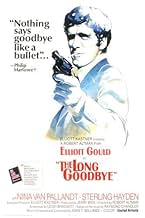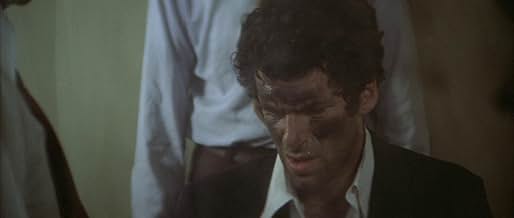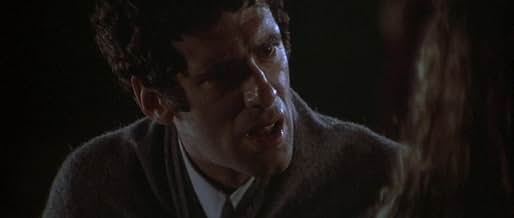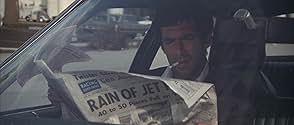L'investigatore privato Philip Marlowe tira un amico fuori dai guai e viene coinvolto nell'omicidio di sua moglie.L'investigatore privato Philip Marlowe tira un amico fuori dai guai e viene coinvolto nell'omicidio di sua moglie.L'investigatore privato Philip Marlowe tira un amico fuori dai guai e viene coinvolto nell'omicidio di sua moglie.
- Regia
- Sceneggiatura
- Star
- Premi
- 2 vittorie e 1 candidatura in totale
Stephen Coit
- Detective Farmer
- (as Steve Coit)
Vincent Palmieri
- Vince
- (as Vince Palmieri)
Pancho Córdova
- Doctor
- (as Pancho Cordoba)
Recensioni in evidenza
Much like the 30's jazz music that opens the movie, The Long Goodbye appears on the surface to take its cue from classic film noir. No surprise here, it is based after all on the Raymond Chandler novel by the same name, Chandler as iconic a figure in the noir realm as you're likely to get and responsible for some of the most distinctly classic moments of the genre (Double Indemnity, The Big Sleep, also Strangers on a Train for Hitchcock). But instead of rehashing styles and themes from a bygone era of film-making, Altman instead takes Chandler's film noir of wandering, and hangs on it his own unique take.
Elliot Gould is Phillip Marlowe. Scruffy, sardonic and alienated private dick with a smart mouth and a cigarette eternally glued to his lips. Altman's twist? He's cool but not the suave kind that would impress dames in the 40's, the Bogart kind. He seems constantly out of place, a bit phased, doomed to observe and comment in his witty repartee on what's going on around him or just let the chips fall where they may. And they do.
Chandler's story is one of his very best. All the staples of noir are present, simultaneously fulfilling the promise of a Phillip Marlowe film and in the same time preparing the ground for Altman's take on it; murder, missing money, unhappy marriages, a private eye hired to investigate. The works. Sprawling and convoluted like the best of noirs usually are. The dialogue crackling with inventiveness, shedding tough guy lingo for a sense of playfulness, rolling in and out of the picture in a stream-of-consciousness way.
Some of the twists and characters seem to carry a sense of seething malice, a fleeting glimpse on the seamy underbelly of the Great American Beast, the scars and ugliness of Hollywood showing behind a faded facade of glamour, an escalating creepiness factor that recalls the later works of David Lynch, predating him by a good number of years as it does. The mousey Dr. Verringe and the whole clinic subplot reminded me of Lost Highway for example.
What really elevates The Long Goodbye in another level is Altman's direction and he has Vilmos Zsigmond with him. This is only my second Altman picture (after McCabe and Mrs. Miller) but 2 hours in his presence were enough to leave an indelible sense that I'm watching the work of a master on top of his craft. Altman's camera is always on the move, slowly panning and floating in and out of the frame, picking up details, guiding the eye but never getting in the middle of the story or screaming for attention. The whole thing has a natural, subdued feel to it, what with the unobtrusive lighting and bleached-out, hazy look; no glitz or glamour here. Only the faded, long-gone impression of it. This is a world we are enmeshed in that surrounds from all sides with hazy reflection.
The Long Goodbye is both a fantastic and somewhat hidden gem of 70's crime cinema and also one of the missing links in the evolution of noir, all the way from Sunset Blvd. to Mullholland Drive. You must visit at some point.
Elliot Gould is Phillip Marlowe. Scruffy, sardonic and alienated private dick with a smart mouth and a cigarette eternally glued to his lips. Altman's twist? He's cool but not the suave kind that would impress dames in the 40's, the Bogart kind. He seems constantly out of place, a bit phased, doomed to observe and comment in his witty repartee on what's going on around him or just let the chips fall where they may. And they do.
Chandler's story is one of his very best. All the staples of noir are present, simultaneously fulfilling the promise of a Phillip Marlowe film and in the same time preparing the ground for Altman's take on it; murder, missing money, unhappy marriages, a private eye hired to investigate. The works. Sprawling and convoluted like the best of noirs usually are. The dialogue crackling with inventiveness, shedding tough guy lingo for a sense of playfulness, rolling in and out of the picture in a stream-of-consciousness way.
Some of the twists and characters seem to carry a sense of seething malice, a fleeting glimpse on the seamy underbelly of the Great American Beast, the scars and ugliness of Hollywood showing behind a faded facade of glamour, an escalating creepiness factor that recalls the later works of David Lynch, predating him by a good number of years as it does. The mousey Dr. Verringe and the whole clinic subplot reminded me of Lost Highway for example.
What really elevates The Long Goodbye in another level is Altman's direction and he has Vilmos Zsigmond with him. This is only my second Altman picture (after McCabe and Mrs. Miller) but 2 hours in his presence were enough to leave an indelible sense that I'm watching the work of a master on top of his craft. Altman's camera is always on the move, slowly panning and floating in and out of the frame, picking up details, guiding the eye but never getting in the middle of the story or screaming for attention. The whole thing has a natural, subdued feel to it, what with the unobtrusive lighting and bleached-out, hazy look; no glitz or glamour here. Only the faded, long-gone impression of it. This is a world we are enmeshed in that surrounds from all sides with hazy reflection.
The Long Goodbye is both a fantastic and somewhat hidden gem of 70's crime cinema and also one of the missing links in the evolution of noir, all the way from Sunset Blvd. to Mullholland Drive. You must visit at some point.
Elliott Gould offers up one of his most amusing performances as Raymond Chandlers' private eye character Philip Marlowe. Marlowe is visited in the wee hours of the morning by his friend Terry Lennox (baseball player Jim Bouton). He does his friend a favour by driving him all the way to Tijuana. Some time after that, he learns that, in fact, Terry's wife Sylvia is dead, presumably killed by Terry, who has also offed himself. Then he is hired for a supposedly simple case: find Roger Wade (Sterling Hayden), a boozy writer, for his wife Eileen (Nina van Pallandt). In the time-honoured tradition of detective fiction, Marlowe will discover that the separate stories turn out to be connected.
Filmmaker Robert Altmans' take on the whole Neo-Noir genre does take some getting used to. It's a lot more irreverent, and goofy, than some people will expect. Devotees of Chandler and classic film noir will likely be dismayed. Scripted by the legendary Leigh Brackett, the dialogue does flow from the mouths of the cast with real ease, and it is reasonably entertaining to watch as this thing develops. After a while, however, even a viewer such as this one can see where the story is headed.
Goulds' version of Marlowe is a real change of pace. He's a quirky, hip, unflappable wise-ass who's willing to head to an all-night supermarket to obtain the only brand of cat food that his pet will eat. And he's just one memorable character in this interesting stew of a film. Hayden plays his washed-up writer for everything that it's worth. Film director Mark Rydell ("The Rose") is clearly relishing his meaty acting role as a brutal Jewish gangster. Henry Gibson ("The Blues Brothers") is an effective weasel as a doctor who expects to be PAID for his services. Danish actress Van Pallandt is alluring as the femme fatale of the piece. And there are a couple of very familiar faces in small roles: Jack Riley ('The Bob Newhart Show'), Rutanya Alda ("Mommie Dearest"), David Carradine as a chatty convict, and even Arnold Schwarzenegger as one of Rydells' goons.
Set in a sunny but rather seedy California of the 70s (complete with spacey hippie neighbours for Marlowe), this is an entertainingly convoluted tale, and a rather slowly paced one, but it always remains...interesting. It's definitely an unusual spin on the typical noir film.
Seven out of 10.
Filmmaker Robert Altmans' take on the whole Neo-Noir genre does take some getting used to. It's a lot more irreverent, and goofy, than some people will expect. Devotees of Chandler and classic film noir will likely be dismayed. Scripted by the legendary Leigh Brackett, the dialogue does flow from the mouths of the cast with real ease, and it is reasonably entertaining to watch as this thing develops. After a while, however, even a viewer such as this one can see where the story is headed.
Goulds' version of Marlowe is a real change of pace. He's a quirky, hip, unflappable wise-ass who's willing to head to an all-night supermarket to obtain the only brand of cat food that his pet will eat. And he's just one memorable character in this interesting stew of a film. Hayden plays his washed-up writer for everything that it's worth. Film director Mark Rydell ("The Rose") is clearly relishing his meaty acting role as a brutal Jewish gangster. Henry Gibson ("The Blues Brothers") is an effective weasel as a doctor who expects to be PAID for his services. Danish actress Van Pallandt is alluring as the femme fatale of the piece. And there are a couple of very familiar faces in small roles: Jack Riley ('The Bob Newhart Show'), Rutanya Alda ("Mommie Dearest"), David Carradine as a chatty convict, and even Arnold Schwarzenegger as one of Rydells' goons.
Set in a sunny but rather seedy California of the 70s (complete with spacey hippie neighbours for Marlowe), this is an entertainingly convoluted tale, and a rather slowly paced one, but it always remains...interesting. It's definitely an unusual spin on the typical noir film.
Seven out of 10.
Phillip Marlowe is out getting food for his cat at 3am when friend Terry Lennox pops over and asks for a lift to Mexico. Marlowe obliges but returns to his home to find the police waiting for him with stories of Terry murdering his wife and Marlowe being an accessory. Three days later he is released from a holding cell whereupon he learns the news of his friend's suicide and all charges are dropped. Determined to get to the bottom of this open and shut case, Marlowe finds himself involved in the stormy marriage of Roger and Eileen Wade and the criminal activities of Marty Augustine.
Hailed as a classic, this film is actually a bit of hard work crossed with cool style in a plot that gets somewhere but seems to take a long time and a million back roads to get there. It won't be to everyone's tastes as a result because, even though I quite liked it, I must confess that the narrative is hard to follow and hard to particularly care much about. The wit of it is watching Marlowe updated a device that will annoy as many as it pleases. In Gould's laidback and shabby detective we have the opposite of the tough and snappy detectives of the genre, but it sits well within the modern setting of the modern generation (as was) with its hedonism and fads. This is interesting but not the same as a good detective story, which sadly this isn't. If you're not won over by the overall approach then it is unlikely that you will find a lot more to fill the time.
Altman's direction is focused on the style and, although he is fairly respectful to the material in regards what happens, he doesn't go out of his way to make it engaging. Gould fits the role well and enjoys his character. I would have liked more of the complexity underneath to come through to contrast with this surface. He is the film but he is well supported by a hammy show from Sterling and solid turns from Rydell, Pallandt, Gibson and Bouton.
Overall then a difficult film to really like. It has enough of its own style to be interesting but not enough of a hook in the narrative to please a mass audience. Altman's hands are all over the film and I understand why some viewers don't like it for that reason. Not one for those looking for a gripping detective story, but still interesting.
Hailed as a classic, this film is actually a bit of hard work crossed with cool style in a plot that gets somewhere but seems to take a long time and a million back roads to get there. It won't be to everyone's tastes as a result because, even though I quite liked it, I must confess that the narrative is hard to follow and hard to particularly care much about. The wit of it is watching Marlowe updated a device that will annoy as many as it pleases. In Gould's laidback and shabby detective we have the opposite of the tough and snappy detectives of the genre, but it sits well within the modern setting of the modern generation (as was) with its hedonism and fads. This is interesting but not the same as a good detective story, which sadly this isn't. If you're not won over by the overall approach then it is unlikely that you will find a lot more to fill the time.
Altman's direction is focused on the style and, although he is fairly respectful to the material in regards what happens, he doesn't go out of his way to make it engaging. Gould fits the role well and enjoys his character. I would have liked more of the complexity underneath to come through to contrast with this surface. He is the film but he is well supported by a hammy show from Sterling and solid turns from Rydell, Pallandt, Gibson and Bouton.
Overall then a difficult film to really like. It has enough of its own style to be interesting but not enough of a hook in the narrative to please a mass audience. Altman's hands are all over the film and I understand why some viewers don't like it for that reason. Not one for those looking for a gripping detective story, but still interesting.
Private investigator Philip Marlowe is approached by a friend, Terry Lennox, who is in a bit of a jam. Marlowe helps him get to Mexico but the next day his friend's wife turns up dead. The police hold Marlowe but then release him once Terry Lennox is found dead in Mexico - suicide. To the cops it is an open-and-shut case of murder-suicide but Marlowe doesn't believe that to be the case. Marlowe then is hired by the wife of wealthy author Roger Wade to find her husband. The Wades were neighbours of the Lennoxes. A powerful mob boss also leans on him to find the large sum of money Terry Lennox was transporting for him. Could all these events be connected?
Robert Altman directs a movie based on a Raymond Chandler novel, and it's a mixed bag.
Starts off very well with some humorous scenes and dialogue and a fair amount of intrigue. The middle-to-end sections lack focus, however, and, while it is never dull, the movie feels like it is drifting to a lacklustre conclusion. The intrigue just seems to get sucked out of the movie in that segment. In addition, the theme song gets played in just about every situation and in various forms - it gets very irritating, very quickly.
Ends well though, with a good twist and a powerful conclusion.
A new take on Philip Marlowe from Elliott Gould - he is hardly Humphrey Bogart and he's not trying to be. Altman's Philip Marlowe is the dishevelled, anti-social chain-smoking anti-hero rather than the suave, confident hero that Bogart portrayed. For the most part, it works, though at times I wished for the coolness and wise-cracks of Bogie.
Supporting cast are fine. Sterling Hayden is great as the larger-than-life, Ernest Hemingway/John Huston-esque Roger Wade.
Not the Philip Marlowe of the Bogart movies, but it'll do.
Robert Altman directs a movie based on a Raymond Chandler novel, and it's a mixed bag.
Starts off very well with some humorous scenes and dialogue and a fair amount of intrigue. The middle-to-end sections lack focus, however, and, while it is never dull, the movie feels like it is drifting to a lacklustre conclusion. The intrigue just seems to get sucked out of the movie in that segment. In addition, the theme song gets played in just about every situation and in various forms - it gets very irritating, very quickly.
Ends well though, with a good twist and a powerful conclusion.
A new take on Philip Marlowe from Elliott Gould - he is hardly Humphrey Bogart and he's not trying to be. Altman's Philip Marlowe is the dishevelled, anti-social chain-smoking anti-hero rather than the suave, confident hero that Bogart portrayed. For the most part, it works, though at times I wished for the coolness and wise-cracks of Bogie.
Supporting cast are fine. Sterling Hayden is great as the larger-than-life, Ernest Hemingway/John Huston-esque Roger Wade.
Not the Philip Marlowe of the Bogart movies, but it'll do.
10faraaj-1
It's true. You can't have mixed feelings about The Long Good-bye; you'll either love it or hate it. I started the movie with what I pretended was an open mind, but a secret hope that I'd be fully justified in hating it. In my defense, The Maltese Falcon is my favorite movie and Bogie is my favorite actor. Noir is my favorite film genre and I love Howard Hawk's The Big Sleep wihich had Bogart as the definitive Marlowe.
Altman's take on Chandler's other book with private eye Marlowe, The Long Good-bye, updates the action to the 1970's. He introduces a very 70's theme song and finds as different an actor as he can from Bogart for the role of Marlowe. From the opening frame, Elliot Gould plays Marlowe like a push-over. He's a man who constantly mutters to himself, suffers nervous tics, can't even fool his cat, is afraid of dog's and seems to be the only man not attracted to his sexy hippie neighbors despite their friendliness towards him and obvious promiscuousness.
However, Gould really creates a unique persona with the way he walks, talks, wise-cracks and operates. He becomes a believable person - which is why the uncharacteristic ending is so impacting. The photography, especially the night scenes, are beautifully filmed. The theme music plays everywhere - a Mexican funeral, a doorbell, a car radio etc and with different singers. There are other layers of flesh added to the telling that really work - like the compound security guards impressions of James Stewart, Barbara Stanwyck, Cary Grant and best of all Walter Brennan aka Stumpy from Rio Bravo.
This movie worked great for me and the plot, intricate though it was, was understandable. I will not compare this Marlowe to Bogart's, but do find it admirable that Altman just stuck to the goal of making a good movie without trying to ape or make obvious references to the noir genre.
Altman's take on Chandler's other book with private eye Marlowe, The Long Good-bye, updates the action to the 1970's. He introduces a very 70's theme song and finds as different an actor as he can from Bogart for the role of Marlowe. From the opening frame, Elliot Gould plays Marlowe like a push-over. He's a man who constantly mutters to himself, suffers nervous tics, can't even fool his cat, is afraid of dog's and seems to be the only man not attracted to his sexy hippie neighbors despite their friendliness towards him and obvious promiscuousness.
However, Gould really creates a unique persona with the way he walks, talks, wise-cracks and operates. He becomes a believable person - which is why the uncharacteristic ending is so impacting. The photography, especially the night scenes, are beautifully filmed. The theme music plays everywhere - a Mexican funeral, a doorbell, a car radio etc and with different singers. There are other layers of flesh added to the telling that really work - like the compound security guards impressions of James Stewart, Barbara Stanwyck, Cary Grant and best of all Walter Brennan aka Stumpy from Rio Bravo.
This movie worked great for me and the plot, intricate though it was, was understandable. I will not compare this Marlowe to Bogart's, but do find it admirable that Altman just stuck to the goal of making a good movie without trying to ape or make obvious references to the noir genre.
Lo sapevi?
- QuizThe location for Roger Wade - Sterling Hayden's home was actually Robert Altman's home at the time.
- BlooperDuring the scene where Marlowe is chasing Mrs. Wade in her top-down Mercedes 450 SL convertible, the car goes from having head rests to having no head rests in various shots.
- Citazioni
Philip Marlowe: Nobody cares but me.
Terry Lennox: Well that's you, Marlowe. You'll never learn, you're a born loser.
Philip Marlowe: Yeah, I even lost my cat.
- ConnessioniEdited into El adios largos (2013)
- Colonne sonoreThe Long Goodbye
by John Williams and Johnny Mercer
Performed by The Dave Grusin Trio, Jack Sheldon, Clydie King, Jack Riley, Morgan Ames, Aluminum Band, The Tepoztlan Municipal Band
I più visti
Accedi per valutare e creare un elenco di titoli salvati per ottenere consigli personalizzati
Dettagli
- Data di uscita
- Paese di origine
- Lingue
- Celebre anche come
- Un largo adiós
- Luoghi delle riprese
- 2178 High Tower Drive, Hollywood, Los Angeles, California, Stati Uniti(Marlowe's residence)
- Aziende produttrici
- Vedi altri crediti dell’azienda su IMDbPro
Botteghino
- Budget
- 1.700.000 USD (previsto)
- Lordo in tutto il mondo
- 27.504 USD
Contribuisci a questa pagina
Suggerisci una modifica o aggiungi i contenuti mancanti


































